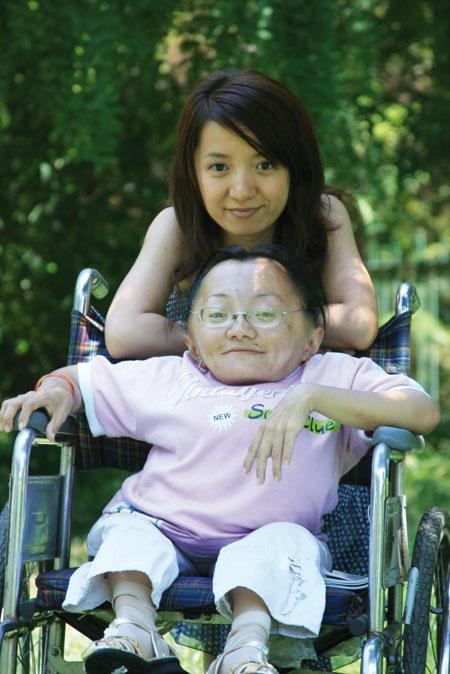Handle with care
Every morning, Zhang Yonghong and his wife arrive at their "office" in an underpass near Beijing Zoo subway station before 7 am.
|
|
|
Wang Yiou, founder of the China- Dolls Care & Support Association pushes Song Bingxin, the first OI patient her association found in Shandong Province in 2009. Photos: courtesy of Wang Yiou |
They heatedly vie with other peddlers and beggars for a 2-meter wide space from which to sell their paper-cuttings.
The couple sell them to raise money to treat their 3-year-old "glass bone" daughter who suffers from osteogenesis imperfecta (OI), an incurable but treatable genetic disorder, sometimes known as brittle bone disease because bones easily fracture. And because of the frequent fractures, the bones are mostly deformed.
Due to the fact that their fragile bones are broke easily and that they generally grow no taller than 120 centimeters, OI sufferers are also known as "china dolls". There are some 100,000 sufferers nationwide, according to rough estimates.
Hard beginnings
Zhang, 37, has been confined to a wheel chair for years. He is 80-centimeters tall.
Born both a dwarf and paralyzed from the waist down to a poor family in a village in Shaanxi Province, he had never thought of getting married until he met Cui Ying, a shoeshine worker in Xi'an in 2005.
Despite objections from her family and their 11-year age difference, Cui, a charming and healthy woman, was married to Zhang in 2006.
Cui, originally from Yan'an in Shaanxi Province, was born into a troubled family. Her mother ran away with another man when she was still a baby girl. A grandmother brought Cui up until age 6 when her grandmother died.
When she was 7, Cui began helping her father with farming and dropped out of primary school at the second grade to sell newspapers to support her brother, who is a year younger.
"Although my husband is a dwarf without much money, he has a nice heart and always helped me whenever I was in trouble or needed money to support my brother to finish school," Cui said.
A joyful burden borne
Two years after they were wed, their daughter Zhang Yutian was born.
However, the little girl brought not only joy, but also endless burdens to the family.
Two days after birth, Yutian's left leg was broken and she suffered many broken bones subsequently due to falls and other mishaps.
Since then, the parents began their odyssey to find medical help for their daughter.
Local hospitals advised Zhang to try Beijing Children's Hospital.
In order to save travel fees, he spent two months transforming his three-wheel vehicle into a multifunctional mini-motorhome.
After a five-day journey, the family arrived in Beijing in May.
At the children's hospital doctors decided that both father and daughter suffered from OI.
"There is a 50 percent probability of OI patients passing it on to their children. Zhang happens to be the unlucky 50 percent," Li Mei, a doctor at Department of Endocrinology of Peking Union Medical College Hospital, told the Global Times.
"The thing is that not many doctors in China know about this disease and few hospitals have the expertise to treat it. Zhang was misdiagnosed with infantile paralysis. Otherwise, he could have been treated earlier or some measures could be taken before he was born," she said.
According to Li, there is not yet a cure for OI but medications and treatment can help improve the density of patients' bones and ease pain and complications. When the bones grow stronger, they can receive orthopedic surgery to correct deformities.
But the treatment is rather expensive. Medication should be taken every three or four months, with each session costing between 1,500 yuan ($223) and 3,000 yuan. Orthopedic surgery can cost about 20,000 yuan.
The cost is especially enormous for a migrant family with a dwarf father. Determined to ease his daughter's OI, Zhang, who originally made a living as a decorative paper-cutter in his home village, began selling paper-cuttings in underpasses close to Beijing Zoo subway station where the couple said the chengguan - urban inspectors –generally don't hassle them.
 0
0 








Go to Forum >>0 Comments